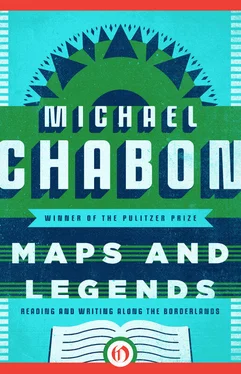Michael Chabon - Maps and Legends - Reading and Writing Along the Borderlands
Здесь есть возможность читать онлайн «Michael Chabon - Maps and Legends - Reading and Writing Along the Borderlands» — ознакомительный отрывок электронной книги совершенно бесплатно, а после прочтения отрывка купить полную версию. В некоторых случаях можно слушать аудио, скачать через торрент в формате fb2 и присутствует краткое содержание. Год выпуска: 2011, Издательство: Open Road Media, Жанр: Критика, Публицистика, на английском языке. Описание произведения, (предисловие) а так же отзывы посетителей доступны на портале библиотеки ЛибКат.
- Название:Maps and Legends: Reading and Writing Along the Borderlands
- Автор:
- Издательство:Open Road Media
- Жанр:
- Год:2011
- ISBN:нет данных
- Рейтинг книги:5 / 5. Голосов: 1
-
Избранное:Добавить в избранное
- Отзывы:
-
Ваша оценка:
- 100
- 1
- 2
- 3
- 4
- 5
Maps and Legends: Reading and Writing Along the Borderlands: краткое содержание, описание и аннотация
Предлагаем к чтению аннотацию, описание, краткое содержание или предисловие (зависит от того, что написал сам автор книги «Maps and Legends: Reading and Writing Along the Borderlands»). Если вы не нашли необходимую информацию о книге — напишите в комментариях, мы постараемся отыскать её.
Maps and Legends: Reading and Writing Along the Borderlands — читать онлайн ознакомительный отрывок
Ниже представлен текст книги, разбитый по страницам. Система сохранения места последней прочитанной страницы, позволяет с удобством читать онлайн бесплатно книгу «Maps and Legends: Reading and Writing Along the Borderlands», без необходимости каждый раз заново искать на чём Вы остановились. Поставьте закладку, и сможете в любой момент перейти на страницу, на которой закончили чтение.
Интервал:
Закладка:
Now here I was, basically required by law, apparently, to start writing a goddamned novel, just because all of these windy people down at Irvine were unable to contain themselves. What kind of novel would I write? Had the time come to leave my current writing self behind?
The truth was that I had come to a rough patch in my understanding of what I wanted my writing to be. I was in a state of confusion. Over the past four years I had been struggling to find a way to accommodate my taste for the fiction I had been reading with the greatest pleasure for the better part of my life — fantasy, horror, crime, and science fiction — to the way that I had come to feel about the English language, which was that it and I seemed to have something going. Something (on my side at least) much closer to deep, passionate, physical and intellectual love than anything else I had ever experienced with a human up to that point. But when it came to the use of language, somehow, my verbal ambition and my ability felt hard to frame or fulfill within the context of traditional genre fiction. I had found some writers, such as J. G. Ballard, Italo Calvino, J. L. Borges, and Donald Barthelme, who wrote at the critical point of language, where vapor turns to starry plasma, and yet who worked, at least sometimes, in the terms and tropes of genre fiction. They all paid a price, however. The finer and more masterly their play with language, the less connected to the conventions of traditional, bourgeois narrative form — unified point of view, coherent causal sequence of events, linear structure, naturalistic presentation — their fiction seemed to become. Duly I had written my share of pseudo-Ballard, quasi-Calvino, and neo-Borges. I had fun doing it. But no matter how hard I tried, I couldn’t stop preferring traditional, bourgeois narrative form.
I wanted to tell stories, the kind with set pieces and long descriptive passages, and “round” characters, and beginnings and middles and ends. And I wanted to instill — or rather I didn’t want to lose — that quality, inherent in the best science fiction, that was sometimes called “the sense of wonder.” If my subject matter couldn’t do it — if I wasn’t writing about people who sailed through neutron stars or harnessed suns together — then it was going to fall to my sentences themselves to open up the heads of my readers and decant into them enough crackling plasma to light up the eye sockets for a week. But I didn’t want to write science fiction or a version of science fiction, some kind of pierced-and-tattooed, doctorate-holding, ironical stepchild of science fiction. I wanted to write something with reach. Welty and Faulkner started and ended in small towns in Mississippi but somehow managed to plant flags at the end of time and in the minds of readers around the world. A good science-fiction novel appeared to have an infinite reach — it could take you to the place where the universe bent back on itself — but somehow in the end it ended up being the shared passion of just you and that guy at the Record Graveyard on Forbes Avenue who was really into Hawkwind. I wasn’t considering any actual, numerical readership here — I wasn’t so bold. Rather I was thinking about the set of axioms that speculative fiction assumed, and how it was a set that seemed to narrow and refine and program its audience, like a protein that coded for a certain suite of traits. Most science fiction seemed to be written for people who already liked science fiction; I wanted to write stories for anyone, anywhere, living at any time in the history of the world. (Twenty-two, I was twenty-two!)
I paced around my room in the basement, back and forth past the bookcase where my stepfather kept the books he had bought and read in his own college days. All right, I told myself, take the practical side of things for a moment. Let’s say that I did write a novel. Your basic, old-fashioned, here-and-now novel. Where would I write it? Novels took time, I assumed. They must require long hours of uninterrupted work. I needed a place where I could set up my computer and spread out and get my daily work done without distraction: Ralph’s room. It had served Ralph as a room of his own, as a secret mountain laboratory; perhaps it would also serve me.
I lugged my computer in there and up onto the workbench. It was an Osborne 1a. I had bought it in 1983 for all that was left of my bar mitzvah money plus everything I had managed to save since. It was the size of a portable sewing machine in its molded plastic case, with two five-and-a-quarter-inch floppy disk drives, no hard drive, and 64 KB of memory. At twenty-five pounds you could shlep it onto an airplane and it would just barely fit under the seat in front of you. Its screen was glowing green and slightly smaller than a three-by-five index card. It ran the CP/M operating system and had come bundled with a fine word processing program called WordStar. It never crashed, and it never failed, and I loved it immoderately. But when I hoisted it onto the surface of Ralph’s workbench, opened up one of the folding chairs that my mother stored in the crawl space, and sat down, I found that I could not reach its keys. Even standing up I could not reach the computer’s fold-down keyboard without bending my forearms into contorted penguin flappers. So I dragged over the black steamer trunk my Aunt Gail had bequeathed to me at some point in her wanderings and set the folding chair on top of it. The four rubber caps of the chair’s steel legs fit on the trunk’s lid with absurd precision, without half an inch to spare at any corner. Then I mounted the chair. I fell off. I repositioned it, and mounted it again more gingerly. I found that if I held very still, typed very chastely, and never, ever, rocked back and forth, I would be fine. Now I just needed to figure out what novel I was going to write.
I went back out to my room and shambled irritably back and forth from the door that led to the hot tub to the door that went upstairs, mapping out the confines of my skull like the bear at the Pittsburgh Zoo. And my eye lighted on a relic of my stepfather’s time at BU: The Great Gatsby.
The Great Gatsby had been the favorite novel of one of those afore-mentioned friends whom I had decided that, for reasons of emotional grandeur and self-poignance, I was doomed never to meet up with again in this vale of tears. At his urging I had read it a couple of years earlier, without incident or effect. Now I had the sudden intuition that if I read it again, right now, this minute, something important might result: it might change my life. Or maybe there would be something in it that I could steal.
I lay on the bed, opened its cracked paper covers — it was an old Scribner trade paperback, the edition whose cover looked like it might have been one of old Ralph’s wood-shop projects — and this time The Great Gatsby read me. The mythographic cast of my mind in that era, the ideas of friendship and self-invention and problematic women, the sense, invoked so thrillingly in the book’s closing paragraphs, that the small, at times tawdry love-sex-and-violence story of a few people could rehearse the entire history of the United States of America from its founding vision to the Black Sox scandal— The Great Gatsby did what every necessary piece of fiction does as you pass through that fruitful phase of your writing life: it made me want to do something just like it.
I began to detect the germ of The Mysteries of Pittsburgh as I finished Fitzgerald’s masterpiece: I would write a novel about friendship and its impossibility, about self-inventors and dreamers of giant dreams, about problematic women and the men who make them that way. I put the book back in its place on the shelf and as I did so I noticed its immediate neighbor: an old Meridian Books paperback edition of Goodbye, Columbus by Philip Roth, the one with the lipstick-print-and-curly-script cover art by Paul Bacon, a master of American jacket illustration who would, in a few years, design a memorable cover for the book I was urging out of myself that day. I had never read Goodbye, Columbus, and as I got back into bed with it I remarked, in its lyric and conversational style, its evocation of an Eastern summer, its consciously hyperbolic presentation of the mythic Brenda Patimkin and her family of healthy, dumb, fruit-eating Jews, and its drawing of large American conclusions from small socio-erotic situations, how influenced Roth had clearly been by his own youthful reading of the Fitzgerald novel. That gave me encouragement; it made me feel as if I were preparing to sail to Cathay along a route that had already proven passable and profitable for others.
Читать дальшеИнтервал:
Закладка:
Похожие книги на «Maps and Legends: Reading and Writing Along the Borderlands»
Представляем Вашему вниманию похожие книги на «Maps and Legends: Reading and Writing Along the Borderlands» списком для выбора. Мы отобрали схожую по названию и смыслу литературу в надежде предоставить читателям больше вариантов отыскать новые, интересные, ещё непрочитанные произведения.
Обсуждение, отзывы о книге «Maps and Legends: Reading and Writing Along the Borderlands» и просто собственные мнения читателей. Оставьте ваши комментарии, напишите, что Вы думаете о произведении, его смысле или главных героях. Укажите что конкретно понравилось, а что нет, и почему Вы так считаете.












